As Jeff Goulding continues his in-depth look back at the men who made Liverpool, he tells the story of Andrew Hannah, the club’s first captain and a ‘world champion’.
When Liverpool Athletic Football Club came into existence, they faced an unusual challenge. Whereas most clubs started out with a team and then progressed to a stadium, the new upstarts in Merseyside football found themselves with an arena and even a box full of kits, but no players. To solve this conundrum the board of directors turned their attention to Scotland.
It was known that the most fearless and skilful players in the land plied their trade north of the border. So it would be there that they would find the club’s first captain, perhaps one of the most colourful characters in the club’s history. His name would have been familiar to the likes of John Houlding, William Edward Barclay and John McKenna. He had already captained Everton to a league title in 1891, before returning to his home in West Dumbartonshire. His name was Andrew Hannah, and this is his story.
It’s May 19, 1888 and we’re in the small town of Renton in Dumbartonshire, Scotland. The skies are still black and there’s a smattering of rain in the air. The thunderstorms of the previous 48 hours, that killed five of the areas inhabitants, have now subsided. With a population of barely 2,000 souls, the loss would have been keenly felt.
Despite the tragedy, a football match had just been played between the champions of Scotland and their counterparts in England. The prize at stake? The title ‘Champions of the United Kingdom and the World’. And despite the weather, 6,000 people attended, most likely from all over Scotland.
Renton FC emerged in 1872 and reached the final of the Scottish Cup on five occasions, winning it twice, in 1885 and 1888. Their second triumph came after a campaign that saw them score 42 goals as they progressed through the rounds. Their opponents in the final were the equally high-scoring Cambuslang. With no league football in Scotland, this would have been the biggest game of the season. They trounced Cambuslang 6-1 to lift the Scottish Cup.
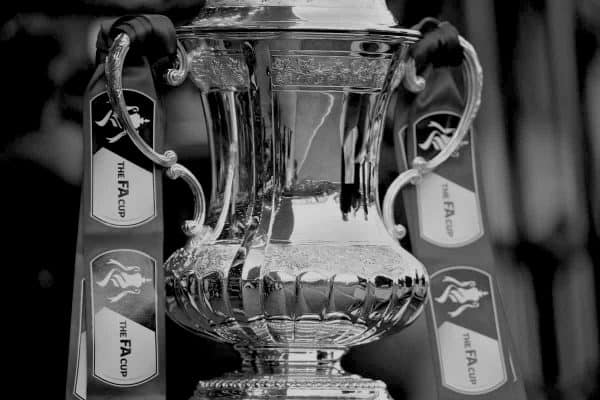
That would set up a remarkable fixture with West Bromwich Albion, holders of the English FA Cup. The game south of the border was a different beast. It was more professional and funded by wealthy industrialists and businessmen. A 12-team league had already been formed, and Albion fancied themselves as the world’s finest. Flushed with pride, they challenged the Scottish ‘minnows’ to a World Championship match. Renton duly accepted.
It is said that, when faced with the appalling weather conditions, the English wanted to call off the game. However, the Scots were insistent it should go ahead. And so it did, with Renton FC defeating their challengers 4-1. It is still regarded as a famous victory north of the border and rightly so, because it would have sent shockwaves through the English game.
So now we arrive back on the morning after this monumental calamity for the English champions. We’re trudging through the mud, our heads still ache from the celebrations the night before but we plough on to the old pavilion at Tontine Park, home of the newly crowned kings of the world. We’re following Andrew Hannah, the team’s inspirational right-back. He’s resolutely marching ahead of the group. In his hand he’s clutching a makeshift plaque, hastily put together the previous day. On it are the words that declare his men to be part of the greatest football team on the planet.
Now, we’ve reached our destination and with obvious pride and to a chorus of cheers, he pins it above the doorway. And in that moment an incredible sporting legend had been born. This group of ‘Davids’ had just slain the footballing equivalent of ‘Goliath’. However, Andy Hannah was destined to create legends of his own on the banks of the River Mersey, but not before the team he had helped to vanquish tried to snap him up first.
In a case of ‘if you can’t beat them, sign them’, West Brom club promptly completed the capture Hannah. However, the Scot couldn’t settle in the Midlands and soon returned home to Renton for another season. It would take overtures from the newly established Everton FC to persuade him to return south in 1889. There he would stay, long enough to win the First Division championship in 1891. Again though, the call of home would prove irresistible and he once more journeyed north to play for his hometown club.
Of course, while he was away a footballing revolution would take place on Merseyside. A new club would be born and a few familiar faces would once again come calling for his services. By now, Hannah was 28 years of age and his huge personality meant he was a target for the armies of agents, employed by English clubs, and who preyed on Scottish football’s brightest talents.
Hannah was quite a character and highly sought after. Perhaps a hint of his eye for intrigue and desire for adventure is the fact that he would later find employment as a dockyard detective. This was a profession later glamourised by author Hugh Munro, who wrote a series of novels in the 1950s about a man called Clutha, employed privately as a detective solving crimes in Glasgow’s dockyards. In addition to his exploits as a 19th century private eye, Hannah would also own a successful milk delivery business. It is unlikely that his exploits in the Clyde shipyards were as fanciful as his literary counterpart, Clutha, nevertheless he was clearly quite a character.
This article in the Kirkintilloch Gazette, dated June 22, 1901, gives us an insight into what a remarkable athlete and colourful individual he was:
“Andrew Hannah, at Renton Games in 1886, won first prize for hop, step and leap – distance on level ground, 47’9”. At Coalburn Games, in the following year, he was first with 47’7″, level ground. At Tullietudlem Games, springing from behind a board, he made 48′ (first try), and at the committee’s request, attempted to clear 59′, but tripped and injured himself.
“At Dumbarton Castle Grounds he did 46’10”. His best long jumps were made at Renton (20’10”) and Coalburn (20’9″). Standing jump, 9’7″; standing hop, step and jump, 29’7″; hitch and kick, 8’7″. Whilst in football outfit he often kicked the crossbar of the goal-posts. He carried off all the jumping events at Everton and Liverpool Games for years, and in a 150-yard handicap there, off five yards, ran second to Fred Geary, the Nottingham flyer.
“He was tied to jump Tom Burrows (hop, step and leap champion of the world) but the stakes were withdrawn. He won a bowling tournament of the Liverpool Club, was in the first three in several billiard handicaps; could putt a 16lb ball 33′, and pole vault 9′.
“Hannah also had the great honour – the lustre of which he did not tarnish – of captaining the famous Renton Football Club when they won the championship of the world. He captained the renowned Everton club when they won the English League Championship, and was for three years’ captain of the formidable Liverpool FC”
However, the best is definitely saved for last in this fascinating article, and it reveals a footballer who clearly feared neither man nor beast:
“Whilst in the latter city [Liverpool], Hannah accepted the challenge of the proprietor of a travelling menagerie to enter the den of lions. His reception was quite friendly. A gold medal was his reward.”
The incident—most likely a publicity stunt for the zoo—occurred on November 25, 1893 and was covered widely in the Lancashire press. The Blackburn Standard reported that Hannah had walked into a lion’s den at Wombwell’s Royal Menagerie in order to win a bet with the zoo’s proprietors. After he had emerged unscathed, he was awarded his wager by the owners, along with a gold medal worth £5.
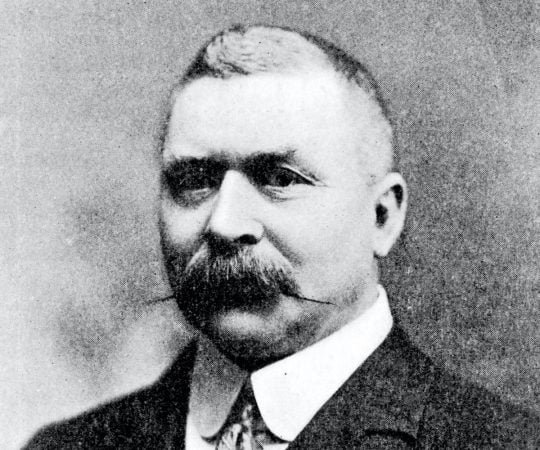
Clearly, as well as being something of an athlete, he was also no ordinary man. He would therefore have driven a hard bargain when Liverpool’s McKenna and Barclay came calling. They would be persuaded to pay him a £150 signing-on fee and a weekly wage of £5. These were big numbers for the time, and his salary would be £2 per week more than Everton had paid him. All of this gives us something of an idea of the esteem in which he was held in the 1890s.
The English media agreed that, despite the outlay, the signing of Hannah was something of a coup. The Birmingham Daily Post had the following to say on June 6, 1892:
“Andrew Hannah, the famous Renton back, who played for Everton two years ago, has been engaged by the new Liverpool club for next season.
“Hannah will act as captain and his power of developing players is so well known that the Liverpool club are fortunate in having secured the man who did so much towards improving the all-round play of the Everton team.”
Field Sport would write: “The merits of Andrew Hannah are well known both as skipper and also as a player, and his mature judgement, together with excellent defensive tactics, makes him most invaluable.”
The Anfielders had clearly signed a leader and someone who was a natural born winner. His capture by Liverpool made him the first player to have captained both Merseyside teams. A distinction he still holds alone to this day. His impact at Anfield was immediate.
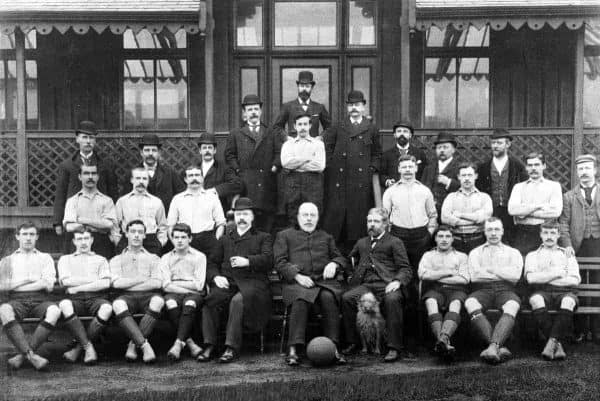
The newly formed outfit, wearing blue-and-white shirts (quarters), took the Lancashire League by storm, even reaching the final of the Liverpool Senior Cup—which Liverpool won, defeating Hannah’s old club Everton. Captaining the side, Hannah, an ever-present for two seasons, led his men to back-to-back promotions, reaching the First Division in 1894.
By now he was 30 years of age and struggling with injuries. Hannah managed just 16 games in the 1894/95 season. Liverpool finished bottom and were relegated back the Second Division. They had lost half of their games and conceded 70 goals. The absence of their inspirational captain may well have contributed to their decline.
With the team relegated and Hannah clearly nearing the end of his powers, he returned to Scottish football. In all he played 69 times for Liverpool (40 times in the league) and scored once. He won the Lancashire League, Liverpool Senior Cup and the Second Division while at Anfield. However, it was his leadership on and off the pitch that served Liverpool well in those formative years. He must also have been an incredible character in the dressing room.
Back in his native Scotland, he turned out for teams like Rob Roy and Barrowfield. By all accounts, despite being far from his prime physically, teams would often tempt him out of retirement with generous appearance fees. Here, the Dundee Courier, reporting on October 22, 1896, suggests that despite his portly physique, he could still play:
“The demands of the business of football are about as serious as those of everyday commercial life. Here we have Andrew Hannah, the old Renton, Everton and then Liverpool back brought under the public gaze of football once more by the Clyde.
“In his day Hannah was the very picture of a back, and his reputation still lives green both at Anfield and Goodison Park, Liverpool.
“Returning to his native ‘Rantin’ three years ago Hannah gave a helping hand now and then to the club of his boyhood; but last season it was thought he had permanently retired from the ring of which he was such an ornament.
“Money, however is very powerful lover in men’s lives, and Andy trotted out all gay under the colours of Barrowfield. He played a good game against the Rangers, but he has a lot of adipose hanging about him. He looked uncomfortable now and again, but in the hands of the trainer he should even yet be able to give us a sample of his former greatness.”
They would drive home the point in another match report, a week later: “Andrew Hannah is not exactly a spent force, although he has pretty much the appearance of being all done up. His heading lacks none of its old accuracy, and his long connection with the football ring gives him judgment second to none in the football realm.”
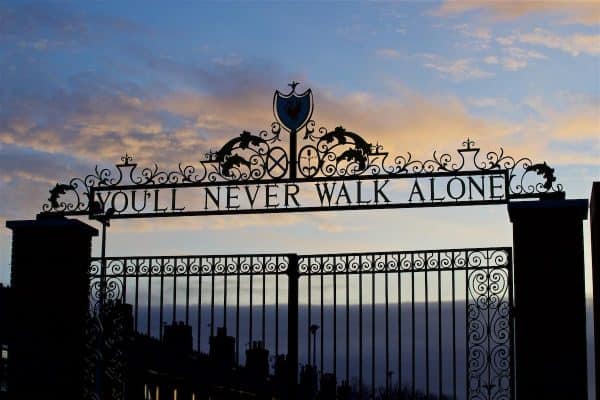
Andrew continued to live a happy and full life in Glasgow until his death in 1940, at the age of 76. He had maintained an interest in football, even applying, unsuccessfully, for the job of manager of Clydebank in 1914. He departed the world as a celebrated figure in Scottish and English football, a sportsman of some repute, and perhaps one of Liverpool Football Club’s most colourful captains.
The Daily Record wrote this obituary on June 6, 1940:
“Another of the great old-timers has passed out. Andrew Hannah, who has died in Clydebank, was one of the famous Renton team which gained the proud title of Champions of the World.
“As right-back, he played for the Scottish League in the first match against the English League, in 1892, at Bolton. Referee was the late John James Bentley, who said it was the cleanest game he had ever seen—he did not have to award a single free-kick.
“As an Anglo-Scot, Andrew Hannah captained Everton during three seasons, and he was a stalwart in the Liverpool team, Everton’s greatest rivals of the time.
“A noted athlete, he won numerous prizes at Highland games, his forte being the hop, step and leap, at which he had done 49′.”
Andrew Hannah was clearly a remarkable man. He was a world champion, as brave as they come, a natural born leader and one of the many men who made Liverpool.
The Men Who Made Liverpool
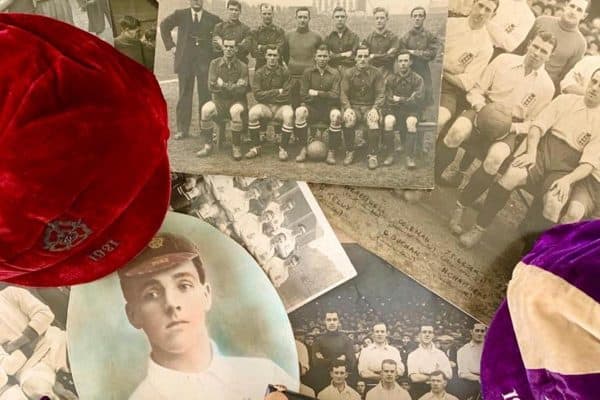
- ‘Honest’ John McKenna – The boy from Ireland who built an empire
- William Edward Barclay – The founding father whose life ended in tragedy
- Walter Wadsworth – Bootle’s fearless fighter, joker and skilful half-back
- George Patterson – The steady hand with an eye for talent
- Tom Bromilow – The superstar half-back they called an “artiste to the fingertips”
- Elisha Scott – The King who befriended the Kop
* Photo courtesy of the Bromilow family.
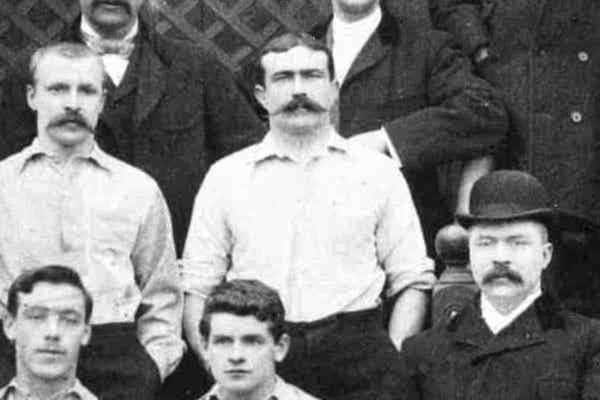



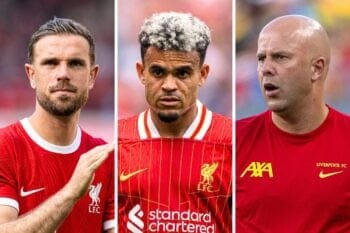
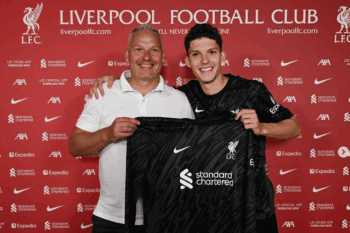







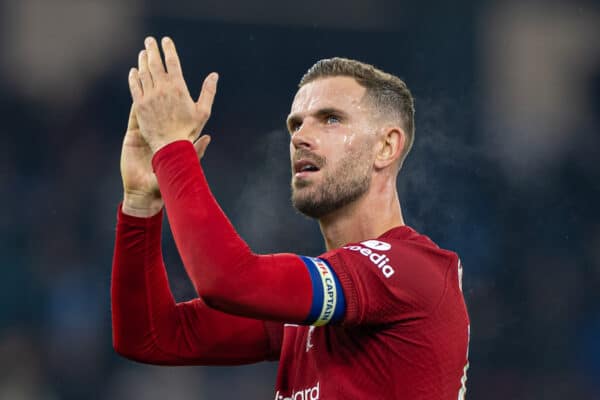



Fan Comments